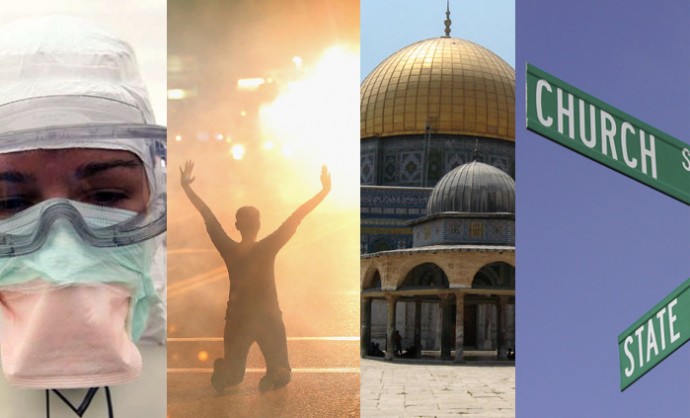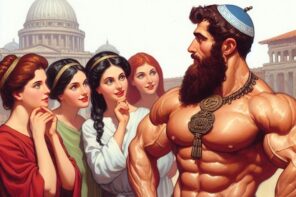At this time of year one can still imagine that somewhere up above, angelic hosts are still singing “Glory to God in the highest! And on earth, peace and goodwill to all.”
Regrettably, most of the earthbound ones who claim to heed heavenly voices still only seem to hear the “glory to God” part while remaining deaf to the rest. At least that is my contention in considering the ways in which religion fueled still more enmity and exclusion during this anno domini 2014. I will offer five examples of religion playing the devil’s part in earthly affairs.
You will see that I follow the good grey John Gray in seriously doubting that all we Western liberals need to do is wait long enough and these things will right themselves, that fear-based hatred and religious fanaticism will inevitably give way to rational thinking. That belief in enlightenment’s ineluctable reign bears its own religious stamp. It’s not magical thinking so much as it is premillennial thinking. And we know how reliably predictive other forms of premillennialism have been.
Without further ado, then, let us take our little tour of religious maleficence as a not-so-great year winds down.
1. This land is my land: the widening arc of 21st century religious warfare
Call it the Temple Mount or the Noble Sanctuary, it is by far the most contested bit of real estate in the world. The decades-long arrangement under which the site was administered by a special trust in Jordan is coming unglued under unrelenting pressure by ultra-orthodox Jews who want to see a Third Temple erected there. Leading Israeli politicians pander to these pressures, making their own provocative statements. Worse, these same politicians backed versions of a proposed nationality law—hugely controversial in Israel and among American Jews, including the ADL’s Abe Foxman—that appears to privilege religion over democracy and that would, among other things, codify the second-class status of non-Jewish Israelis—most notably, Arabs.
You can say, if you like, that this is about ethnicity, not religion, but without the strong religious claim that Jews have a divinely-bestowed right to all of Jerusalem and all of ancient “Judea and Samaria,” this move toward creating a full-on apartheid state would not be happening.
Not that militant Islam is without its own aggressions. So many, in fact, that it’s hard to keep track. In their pursuit of a new caliphate, the Islamic State butchers have already obliterated the hated Sykes-Picot line between Syria and Iraq. Thanks in part to what is widely viewed in the region as a hamfisted U.S. intervention, the Taliban are staging a fierce comeback in both Afghanistan and Northern Pakistan. The slaughter of children in Peshawar won’t be the end of it. In Northern Nigeria Boko Haram is determined to eliminate all non-Islamic schools and drive out the Christians. DIY jihadists commit random acts of violence everywhere from Ottawa to Sydney.
And are there Christians anywhere who still wage war on non-Christians? We don’t see it, but in the eyes of many, that would be us Americans with our thousands of armed “advisors” still bunkered down in Afghanistan and Iraq and with our bombs and drones striking from the sky anywhere we want them to strike. Not to mention the fact (as noted by Sarah Posner in these pages) that white American Christians are more approving of torture as an instrument of foreign policy than is any other segment of the U.S. population. This finding comes as no surprise to those targeted by our War on Terror.
The usual assertion that violence and aggression are, in fact, un-Islamic or alien to the true spirit of Judaism or Christianity just won’t hold up. You can call the aggressors “extremists” if you wish, but you cannot deny their religious devotion. You can argue, as Karen Armstrong argues in her new book, that violence is not an “inherent” part of religious faith, but I don’t believe you can really argue that the world’s most violent actors today aren’t religious.
2. A still-raw rift over government’s role that has deep religious roots
There’s no end of bloviation about divided government in the U.S., but I want to suggest that the deeper source of conflict is religious or at least religiously infused.
Competing religious visions about how life among Europeans in North America should be ordered go way back to the late 17th century, when the commonwealth vision expressed so clearly in John Winthrop’s “A Model of Christian Charity” was undercut by rising commercial fortunes among seafaring merchants. Puritan preachers in port cities like Salem and Newburyport began suggesting that unlimited private wealth and rising social inequality were just fine in God’s eyes.
Eventually, their wealth-friendly theology prevailed, and it remains the dominant American theology, including the important tenet of faith that enough wealth will trickle downward to ensure social comity and stability.
Fast forward to the 21st century and the debate is much the same. And it’s not that all Democrats hew to the commonwealth ideal. The most intense ideological conflict today isn’t between Democrats and Republicans but between Warren Democrats who want to resist wealth’s domination and Clintonistas who are quite comfortable with the way things are trending. The related religiously-rooted rift in national politics is between leaders who still pledge their allegiance to the old “redeemer nation” idea and those in both parties (e.g., Rand Paul) who see the claim of American exceptionalism to be both deluded and dangerous.
3. Two nations, one black and one white
It’s not just that Sunday morning at 11 remains the “most segregated hour” in the American week. It’s that black Americans and white Americans have profoundly different visions of what equal justice means and of the extent to which equal justice has been achieved.
All polls suggest that white Americans are satisfied with what we might call formal equal justice or “procedural” equality, whereas the vast majority of black Americans are deeply committed to substantive justice and economic equality. The difference reflects the different religious visions about what government should do, with African-Americans still attached overwhelmingly to the old commonwealth vision. But it goes much deeper, inasmuch as blacks both see and experience the brutal underside of the “redeemer nation” mythology. For centuries they have seen and experienced American trimphalism as a parallel triumph of white supremacy.
These competing visions come into sharpest focus during that segregated hour on Sunday. It oversimplifies the case, but not by much, to say that black Christians identify with those whom God delivers from the house of bondage, whereas white Christians are conflicted about whether to identify with the oppressed Israelites or with Pharoah and Pharoah’s enforcers. You needn’t take my word for it. You can ask Walter Brueggemann about the degree to which imperial religion has effectively colonized white American Christianity. Or you can ask any black Christian whether Dr. King was right to say that America “is in danger of becoming a ‘thing’ society,” and he or she will answer that, if anything, King was understating the case back in 1967.
All this was brought home to me earlier this year. I was in a black church in South Los Angeles, beta-testing a new criminal justice curriculum. Toward the end of the three-hour conversation an older woman confided that “we never did think of white people as Christians” when she was growing up. And why would she have? All she could see was cruelty and greed. Not her idea of Christian conduct.
4. Ritual purity in responses to Ebola and toward immigrants
While the rest of the world could hardly believe that major U.S. cities were mandating long quarantines for anyone returning from West Africa (thereby impeding medical relief efforts), most Americans were far more upset by the Obama Administration’s refusal to follow suit. Obama’s calls for “science, not fear” to prevail in regard to Ebola fell on mostly deaf ears in this country.
Deep fear of contamination from the outside has always been reinforced by religious notions of what is clean and unclean. “We” become pure and undefiled before God as long as we remain militant about enforcing boundaries between us righteous ones and those corrupted aliens. European anti-Judaism rests on this foundation. Fourteenth century Christian lamentations linking the Black Plague to alien contamination differ very little from late 20th century Christian pronouncements linking AIDS to homosexual degeneracy.
Now comes Ebola, and why are we surprised that a majority of Americans would rather let the African millions perish than let this alien contamination cross our boundaries?
Loathing of the immigrant hordes also expresses a kind of religious fastidiousness. For every U.S. religious leader who speaks up for humane immigration reform, there are ten who fret either privately or out loud about the dangers of letting “them” enter and/or stay here. And the publicly discussed dangers (to white political power, to cultural cohesiveness, to environmental sustainability) are but the tip of a vast impassable iceberg that is kept perpetually frozen by fear-based religious ideation.
5. Encroachments at the intersection of Church and State
The Hobby Lobby decision isn’t the end, folks. There’s more, much more, litigation being cooked up in the glowing ovens of the Becket Fund, the Alliance Defense Fund, and other well-furnished reactionary kitchens.
You can say (and if you do I will quickly concur) that the First Amendment has always been contested territory. The difference, I would say, is that in days past you would find many of the religious standing up for a strong secular civil state, whereas today the vast majority of the self-described faithful in this contest are among those demanding greater deference to religious “liberty.” On the other side, worried about the new encroachments, you will find precious few who say their worry is grounded in part in their robust religious faith. This spells more setbacks for secularism, in my view. At least until the encroachers go too far. But they are not stupid. They are not Taliban. Not quite.
—-
Alas, dear reader, by now you must imagine that I relish painting a grim picture of religion’s role in contemporary affairs. I do not. And I remain acutely mindful of religion’s potential to heal deep wounds and to free people from every form of oppression. I merely want us to take the full measure of what we are up against. In my own Christian tradition we talk about doing actual battle with powers and principalities. Not to see toxic religion among the powers we must contend against means we will be missing the mark.
That’s what I think, anyway, but let me know if my take on things is too negative. As I write, lots of friends are celebrating the new pope’s role in helping to end 54 years of U.S. cruelty toward Cuba. Share your own examples of good religion peeping out here and there. I’d like to end the year with a dollop of good cheer on top of my plum pudding.
Note: An earlier version of this story mentioned Israel’s constitution, but the country does not, in fact, have a formal constitutional document. We regret the error.





